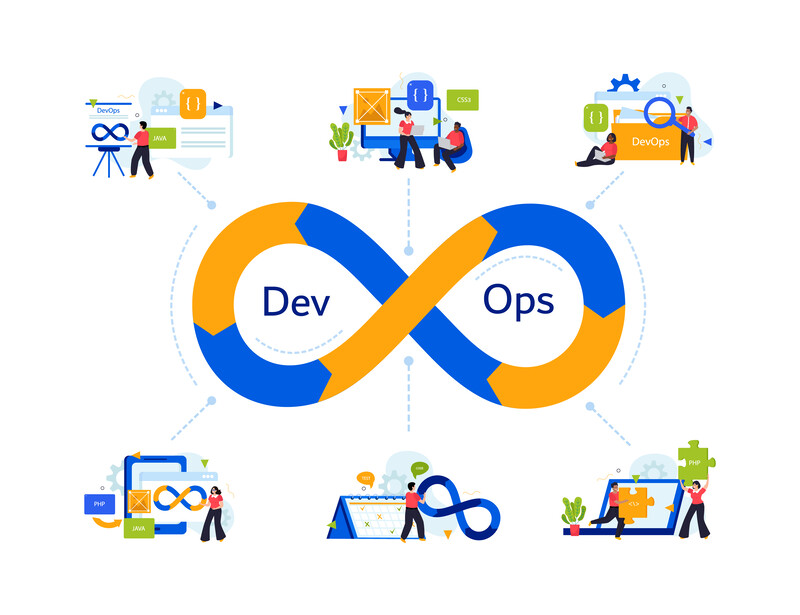DEVOPS SERVICES: REVOLUTIONIZING FIELD SERVICE INDUSTRY
After implementing our DevOps services, our client’s field service system automated over 1,100 test cases in a single day. This quantity of test cases usually takes at least a week to complete manually with a team of QA engineers. This highlights the potential of digital transformation in improving field service operations. Continue reading to learn how outsourcing DevOps services assist the customer in increasing the efficiency of their organization.
The Impact of DevOps Services on the operations of Field Service Industry
Overview of Field Service industry
Field service typically involves on-site work at a customer’s location, including installation, maintenance, or repair of equipment or systems. This sector entails dispatching skilled technicians to support customers and provide technical services as needed.
The sector is distinguished by its reliance on mobile workforces, complex scheduling, and the importance of precise coordination. Efficient operations are critical because they immediately affect client satisfaction, service quality, and operating expenses. As the market grows, field service expands into new industries such as facilities management, healthcare, manufacturing, and beyond.
Digital Transformation in the Field Service industry
Similar to other industries, digital transformation has been a driving force in increasing efficiency in the field service industry. Companies in this sector can improve their operations further thanks to technologies like Internet of Things (IoT) and mobile devices. These technologies enable real-time data collection, remote diagnostics, and predictive maintenance. As a result, they help reduce downtime, improve first-time fix rates, and enhance overall service efficiency. For more specific examples, see our article on how digital transformation services can improve financial data management.

Despite these advancements, many field service companies still face major challenges, such as integrating different technologies, managing data from multiple sources, and ensuring effective internal communication. The best solutions to efficiently handle these difficulties are DevOps services. The integration of software development and IT operations, known as DevOps methods, enhances internal organization collaboration and productivity. Field service businesses benefit from this strategy’s improved communication, streamlined procedures, and improved outcomes.
Integrating DevOps Services to Enhance Field Service Industry Operations
To further assess the impact of DevOps services, consider how our solutions enhanced our client’s operations. Our client is a leading digital marketplace. They connect homeowners with prescreened, local service professionals for home improvement, maintenance, and remodeling projects. Seeking to accelerate their software production cycle, the client aimed to drive digital transformation. Moreover, they wanted to leverage advanced tools and agile methodologies. IMT Solutions collaborated with the client to implement solutions and test automation, aiming to enhance the speed, quality, and consistency of their software releases.
The Challenge
The client’s existing regression test suite comprised over 1,100 test cases, which, when executed manually, required the entire QA team at least a week to complete. The client’s goals included:
- Completing the full web app regression test within one day with minimal manual QA involvement.
- Updating the test case management system to indicate which test cases had been automated.
- Enabling any developer or QA engineer to launch the tests on various environments (QA, PreProd, Staging, etc.) with a simple button push.
- Providing a debugging option for issues that arise during automation execution.
- Including training for the client’s team to maintain and extend the automated tests in the future.
Our Approach
IMT Solutions deployed a team of six DevOps engineers over an eight-month period to address the client’s needs. Our approach included:
- Designing and Implementing the Automation Framework: We created a flexible automation framework to minimize the need for creating or rewriting scripts for new features. This allowed for easy adaptation to evolving requirements, reducing maintenance time and effort.
- Data-Driven Approach: By separating test data from test scripts, we enhanced flexibility and manageability. This approach allowed for efficient updates to test data without altering the scripts, facilitating quicker adjustments and reducing errors.
- Developing Common Libraries:We developed reusable libraries following strict coding guidelines to ensure consistency and maintainability. These libraries contained common functions and procedures, promoting code reuse and improving collaboration among team members.
- Logging Functionality: The automation framework included comprehensive logging functionality to support debugging and issue resolution. Detailed logs provided insights into the execution flow and captured crucial information for identifying and resolving issues promptly.
- Ease of Use: We designed a simple and intuitive test management web interface, enabling any team member to run automation scripts and view results. Features like one-click test execution and environment selection made the process accessible and streamlined, encouraging broader team involvement.
The technologies used in this project included:
- Testing Tools: Selenium, TestNG 6, Maven
- Cloud Services: Amazon AWS
- Programming Languages: Java, JavaScript
- Methodologies: Data-driven approach to test automation

The Results
Through our DevOps services, the client achieved the following results, driving digital transformation for the client:
- Automation of 1,100 Test Cases: We successfully automated the entire regression test suite, which previously required extensive manual effort. This automation ensured that all 1,100 test cases could be executed swiftly and accurately, eliminating human error and increasing reliability.
- Reduction in Manual Effort: The implementation of automated testing reduced the QA team’s manual effort by 80%. This allowed QA engineers to focus on more strategic tasks, rather than being bogged down by repetitive manual tests.
- User-Friendly Interface: We developed a test management web interface that was simple and intuitive. This enables any team member to easily run automation scripts and view results. The accessibility ensured that both developers and QA engineers could initiate tests and interpret outcomes without specialized training.

Why choose outsourcing DevOps services for your business?
As mentioned earlier, DevOps practices offer numerous advantages for businesses in the field service industry. However, these benefits extend beyond this sector, since DevOps services deliver value across a variety of sectors:
- Improved Collaboration: By eliminating silos between development and operations teams, DevOps fosters a culture of collaboration and shared responsibility, resulting in more cohesive and efficient workflows.
- Continuous Improvement: DevOps encourages a mindset of continuous improvement, promoting regular feedback and iteration, which leads to higher-quality software and services.
- Scalability and Flexibility: DevOps services enable businesses to scale operations seamlessly, adapting to changing demands and growing without compromising performance or reliability.
- Reduced Downtime: Automated testing and deployment minimize errors and downtime, ensuring that critical systems remain operational and accessible to users.
- Cost Efficiency: By automating routine tasks and optimizing resource usage, DevOps helps businesses reduce operational costs and allocate resources more effectively.
In conclusion, DevOps services provide transformative advantages not only for the field service industry but also for sectors like finance, healthcare, retail, and more. By boosting efficiency, fostering collaboration, and driving innovation, DevOps helps businesses remain competitive and offer exceptional services to their customers. Our company specializes in outsourcing DevOps services tailored to meet each client’s unique needs. Contact us today to start your business on the path to digital transformation.


















